
Part 2 ( 1904 - 1955 )
—
True E. Smith, 1904-1905 (26)
 Born in Nottingham, NH to George and Mary Smith (nee Allen), True Smith moved to Newmarket as a young man and went to work at John H. Griffin’s hardware store, where he quickly became the townspeople’s favorite clerk. Over the years, True had a number of other jobs as well, including selling lumber for prominent businessman and vice president of the New Hampshire Lumbermen’s Association, John Walker. He eventually opened his own sheet metal business near the center of town. As his business grew, True took a more active role in the town affairs, serving as treasurer of the school district and becoming a respected justice of the peace and notary public who attended to the estates of many family, friends, neighbors, and fellow businesspeople. True died in Exeter, NH, in 1932.
Born in Nottingham, NH to George and Mary Smith (nee Allen), True Smith moved to Newmarket as a young man and went to work at John H. Griffin’s hardware store, where he quickly became the townspeople’s favorite clerk. Over the years, True had a number of other jobs as well, including selling lumber for prominent businessman and vice president of the New Hampshire Lumbermen’s Association, John Walker. He eventually opened his own sheet metal business near the center of town. As his business grew, True took a more active role in the town affairs, serving as treasurer of the school district and becoming a respected justice of the peace and notary public who attended to the estates of many family, friends, neighbors, and fellow businesspeople. True died in Exeter, NH, in 1932.
Alvah H. Place, 1906-1907 (27)
Alvah Place was born in Strafford, NH, in 1861 to John Tuttle and Sarah Waterhouse. He took the last name Place to honor his aunt, Hannah Place from Milton, NH, who raised him after his mother died when he was just four years old. Alvah became a full-time farmhand at age twelve and an assistant to Reverend George Spaulding of Dover, NH, at age fourteen, but despite having to work at such an early age, he was able to complete his education and began training as a druggist under John Twombly in 1882. In 1885, he purchased Twombly’s business and turned it into one of the most popular drugstores in the area. A longtime member of the town’s Republican Party who served as a state representative in 1897, Alvah changed his political affiliation in 1914 when ran for state senate as a member of Teddy Roosevelt’s Bull Moose (or Progressive) Party.
F. Elmer Tuttle, 1908-1909 (28)
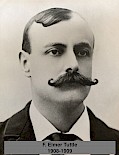 The son of Civil War veteran Freeman H. Tuttle and Lucy Decker, F. Elmer Tuttle was born and raised in Newmarket. As a boy, he began working at the Newmarket Manufacturing Company, where he earned the respect of the local community and the leaders of the business district, many of whom noted that F. Elmer was a “universally esteemed” man of “sterling principle and upright character.” During his tenure at the NMC, where he eventually became the company’s paymaster, F. Elmer was active in local politics, serving as a fish and game warden, town auditor, and trustee of the public library. In 1896, he married Josephine Young of Everett, MA, and in 1909 the couple decided to leave Newmarket. They lived for a short time in Connecticut before settling in Josephine’s hometown, where F. Elmer went to work for the Boston Varnish Company. Shortly after the move to Massachusetts, F. Elmer contracted Typhoid. He succumbed to the disease in 1910 at the age of 41.
The son of Civil War veteran Freeman H. Tuttle and Lucy Decker, F. Elmer Tuttle was born and raised in Newmarket. As a boy, he began working at the Newmarket Manufacturing Company, where he earned the respect of the local community and the leaders of the business district, many of whom noted that F. Elmer was a “universally esteemed” man of “sterling principle and upright character.” During his tenure at the NMC, where he eventually became the company’s paymaster, F. Elmer was active in local politics, serving as a fish and game warden, town auditor, and trustee of the public library. In 1896, he married Josephine Young of Everett, MA, and in 1909 the couple decided to leave Newmarket. They lived for a short time in Connecticut before settling in Josephine’s hometown, where F. Elmer went to work for the Boston Varnish Company. Shortly after the move to Massachusetts, F. Elmer contracted Typhoid. He succumbed to the disease in 1910 at the age of 41.
Albert E. Stevens, 1910-1912 (29)
After graduating from Newmarket High School in the late 1880s, Albert Stevens dedicated his life to agriculture. He eventually started a dairy business that serviced Newmarket and several other towns in the area. In 1898, while making his daily milk deliveries, he found local businessman John O. Davis dead at the foot of the man’s basement steps, which left Albert shaken for some time. As a member of the New Hampshire State Grange, an agrarian organization established in 1867 with a focus “towards attaining a good and full life for all citizens of rural America,” Albert advocated for the construction of “electric roads” in the greater Durham, NH, area, which many other members of the Grange vehemently opposed. The so-called “electric road” was a railroad car powered by overhead electric wires as seen in the cities. In February 1921, Albert checked into Peter Bent Brigham hospital in Boston in order to have a tumor removed from his brain. He survived the surgery but died a few months later on June 18, 1921.
Frank H. Durgin, 1913-1914 (30)
 Born in neighboring Lee, NH, in 1863, Frank Durgin moved to Newmarket at the age of 18 and purchased a grocery business with his brother, John. Located in a downtown building in what would eventually become known as the Durgin Block of property, the wooden store was destroyed by fire in 1894, rebuilt of brick it survived another serious fire in 1899. After moving to town, Frank joined several fraternal organizations and became active in local politics, serving as town selectman, town treasurer, state representative, and state senator. In 1888, Frank married Martha Slater of Attleboro, MA, and the couple went on to have three sons. Their eldest son, Robert, died of influenza while serving as a second lieutenant in the army during World War I. In 1910, while Frank was serving on the board of directors of the Newmarket National Bank and working as its president, bank employees presented him a quilt embroidered with the signatures of family, friends, and New Hampshire Governor Henry B. Quinby.
Born in neighboring Lee, NH, in 1863, Frank Durgin moved to Newmarket at the age of 18 and purchased a grocery business with his brother, John. Located in a downtown building in what would eventually become known as the Durgin Block of property, the wooden store was destroyed by fire in 1894, rebuilt of brick it survived another serious fire in 1899. After moving to town, Frank joined several fraternal organizations and became active in local politics, serving as town selectman, town treasurer, state representative, and state senator. In 1888, Frank married Martha Slater of Attleboro, MA, and the couple went on to have three sons. Their eldest son, Robert, died of influenza while serving as a second lieutenant in the army during World War I. In 1910, while Frank was serving on the board of directors of the Newmarket National Bank and working as its president, bank employees presented him a quilt embroidered with the signatures of family, friends, and New Hampshire Governor Henry B. Quinby.
Joseph Carter, 1915-1916 (31)
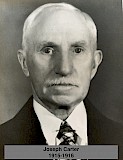 Born in England in 1861, Joseph Carter came to Newmarket from Norwich, CT, where he had met his future wife, Georgiana Stubbs. The couple were married on Christmas Eve in 1884 and went on to have four children: Helen, Frederic, William, and Raymond. After moving to town, Joseph went to work for the Newmarket manufacturing Company. In 1905, he was promoted to overseer of the company’s silk department, a position he held for twelve years until he decided to move his family back to Connecticut. They returned to the area in 1921, residing in neighboring Newfields, NH. Joseph eventually went back to work for the Newmarket Manufacturing Company, becoming a prominent figure at their Lowell, MA, factory.
Born in England in 1861, Joseph Carter came to Newmarket from Norwich, CT, where he had met his future wife, Georgiana Stubbs. The couple were married on Christmas Eve in 1884 and went on to have four children: Helen, Frederic, William, and Raymond. After moving to town, Joseph went to work for the Newmarket manufacturing Company. In 1905, he was promoted to overseer of the company’s silk department, a position he held for twelve years until he decided to move his family back to Connecticut. They returned to the area in 1921, residing in neighboring Newfields, NH. Joseph eventually went back to work for the Newmarket Manufacturing Company, becoming a prominent figure at their Lowell, MA, factory.
Fred C. York, 1917-1918 (32)
Fred York was born in Lee, NH, in 1883 to Fred B. York and Olivia Otis, and as an adult, he became a fixture in the local community. He served on the board of education, as trustee of the town trust fund, and as a town selectman. In the spring of 1924, the town appointed him to a three-person committee tasked with studying the feasibility of establishing an official town forest and conservation area. Later that year, he married Ada Maude Perkins of Nottingham, NH, who was living in Newmarket at the time. In 1931, the town of Newmarket selected Ada to serve on a charitable committee to work with the New York Herald Tribune on the “Fresh Air Fund,” a program that offered disadvantaged city children a two-week vacation on a farm. Fred and Ada lived in and around Newmarket for many years until Ada died in 1943 at the age of 54.
Fred J. Durell, 1919-1920 (33)
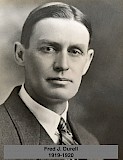 Fred Durell was born in neighboring Lee, NH, in 1881 to William Durell and Mary David. He moved to Newmarket after he graduated from the New Hampshire College of Agriculture and the Mechanical Arts in 1900 with a two-year degree in agriculture. His degree led him to the local chapter of the New Hampshire State Grange, and he eventually served as its delegate to the state organization. Fred also held a number positions in town government, including town auditor and water commissioner. In October 1904, he married Lillian May Burley of Newmarket, and sometime thereafter went to work at the Newmarket National bank, where worked his way up from assistant cashier to bank president and honorary chairman. Fred died in Exeter, NH, in 1964.
Fred Durell was born in neighboring Lee, NH, in 1881 to William Durell and Mary David. He moved to Newmarket after he graduated from the New Hampshire College of Agriculture and the Mechanical Arts in 1900 with a two-year degree in agriculture. His degree led him to the local chapter of the New Hampshire State Grange, and he eventually served as its delegate to the state organization. Fred also held a number positions in town government, including town auditor and water commissioner. In October 1904, he married Lillian May Burley of Newmarket, and sometime thereafter went to work at the Newmarket National bank, where worked his way up from assistant cashier to bank president and honorary chairman. Fred died in Exeter, NH, in 1964.
J. Fred Todd, 1921-1922 (34)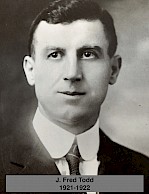
J. Fred Todd and his wife Lucille Maden immigrated to the United States in 1914, just prior to the outset of the First World War, from Shelf, Yorkshire, England. In 1915, the couple’s only son, Gordon F. Todd, was born in Exeter, NH. Two years later, while living and working in Newmarket, J. Fred, who was born on the Fourth of July in 1880, became a naturalized U. S. citizen. In September 1922, the family moved to Buffalo, NY, after J. Fred, a carpenter by trade, accepted a position at an area building firm. A few years later, the family moved back to New England, settling in Providence, RI, where Gordon eventually attended Brown University. After graduating, Gordon became the technical director and chief chemist for Collyer Insulated Wire in Lincoln, RI.
William T. Lee, 1923-1925 (35)
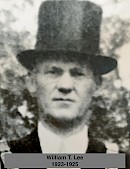 Born just a few minutes from the Canadian border in Calais, ME, William Lee, who had worked at the Newmarket Manufacturing Company for a time before moving to Waltham, MA, and then back to his parents’ home, settled in Newmarket in late 1917 after marrying lifelong town resident Magdalene Gordon in November of the that year. He went back to work at the Newmarket Manufacturing Company and eventually became overseer of the mule spinning room in the mill, where he suffered a serious elbow injury in 1924. When the NMC moved the bulk of its operations to Lowell, MA, William went to work for the University of New Hampshire as a night watchman, a position he held for a number of years until illness forced him to retire. In March of 1948, William sustained several severe injuries as a result of a fall down a flight of stairs. He died in Exeter Hospital a day later at the age of 62.
Born just a few minutes from the Canadian border in Calais, ME, William Lee, who had worked at the Newmarket Manufacturing Company for a time before moving to Waltham, MA, and then back to his parents’ home, settled in Newmarket in late 1917 after marrying lifelong town resident Magdalene Gordon in November of the that year. He went back to work at the Newmarket Manufacturing Company and eventually became overseer of the mule spinning room in the mill, where he suffered a serious elbow injury in 1924. When the NMC moved the bulk of its operations to Lowell, MA, William went to work for the University of New Hampshire as a night watchman, a position he held for a number of years until illness forced him to retire. In March of 1948, William sustained several severe injuries as a result of a fall down a flight of stairs. He died in Exeter Hospital a day later at the age of 62.
John F. Durgin, 1926-1927 (36)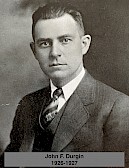
John Durgin was born in Newmarket on February 16, 1896. In 1917, after the U.S. entered World War I, he left his job managing the coaster booth at Canobie Lake Park in Salem, NH, to enlist in the Army. After training at Camp Gordon in Georgia and Camp Meade in Maryland, he was stationed in Vancouver, WA, where he served as a second lieutenant in the Army Air Corps. When he returned to Newmarket in 1919, John went to work for the Newmarket Manufacturing Company, where he eventually became overseer of the silk room, and attended the New Hampshire College of Agriculture and the Mechanical Arts, where he completed a bachelor’s degree in agriculture. John married Eudora Gallant from Delaware, NY, in 1924, and the couple briefly left Newmarket for the greater Boston area. Upon their return to Newmarket, John went to work at the Newmarket National Bank, where he stayed until illness forced him into retirement in his late 60s.
James B. Griffin, 1928-1929 (37)
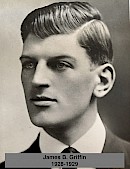 James Griffin, whose family owned and operated Griffin’s Hardware Store in town, graduated from Newmarket High School in 1907. He earned a bachelor’s degree at Dartmouth in 1912 and graduated from Harvard Law School in 1916, which led to a position as a clerk at Alger and Ayers, a prestigious New York City law firm. In September 1917, James left his job in New York to join the Navy. He attended the United States Naval Academy in Annapolis and served as second lieutenant during the First World War. When he returned to Newmarket after the war, he became active in local politics, eventually joining the Citizens’ Committee, a small political movement dedicated to nonpartisan politics. In 1931, New Hampshire Governor John Winant appointed a reluctant James to serve as municipal judge for the town of Newmarket, a position he held for two decades. Later that year, Judge Griffin, who had always had a fondness for the theater, appeared in a production of The College Flapper at the Newmarket Town Hall. Judge Griffin died in a VA hospital in 1959 at the age of 67.
James Griffin, whose family owned and operated Griffin’s Hardware Store in town, graduated from Newmarket High School in 1907. He earned a bachelor’s degree at Dartmouth in 1912 and graduated from Harvard Law School in 1916, which led to a position as a clerk at Alger and Ayers, a prestigious New York City law firm. In September 1917, James left his job in New York to join the Navy. He attended the United States Naval Academy in Annapolis and served as second lieutenant during the First World War. When he returned to Newmarket after the war, he became active in local politics, eventually joining the Citizens’ Committee, a small political movement dedicated to nonpartisan politics. In 1931, New Hampshire Governor John Winant appointed a reluctant James to serve as municipal judge for the town of Newmarket, a position he held for two decades. Later that year, Judge Griffin, who had always had a fondness for the theater, appeared in a production of The College Flapper at the Newmarket Town Hall. Judge Griffin died in a VA hospital in 1959 at the age of 67.
Robert H. Naves, 1930-1931 (38)
Born in New Brunswick, Canada, on August 15, 1894, Robert Naves moved to the United States in 1914 and worked as a painter. In 1918, one year after petitioning the U.S. government for citizenship, Robert enlisted in the Canadian Expeditionary Forces, which assigned him to the Corps of Canadian Railway Troops for the duration of World War I. In January 1915, Robert married Minnie Willis of North Pownal, VT, in a small ceremony in North Adams, MA. After residing in Newmarket for a time, the couple settled in Exeter, NH, where they had one son, Robert Willis Naves, who would later go on to serve as a member of Merrill’s Marauders during World War II. On January 27, 1934, Robert H. Naves was rushed to Exeter Hospital after suffering an accidental gunshot wound. He died thirty minutes after he arrived. He was just 39 years old.
Edward L. Getchell, 1932-1933 (39)
 Born in Winslow, ME, on May 4, 1884, Edward Getchell graduated from the University of Maine with a BS in electrical engineering in 1914. Two years later, he married Alice Forbes, a school teacher from Mattapoisett, MA, in a ceremony held just outside of her hometown. The couple settled in Durham, NH, and became well-known figures in that town and in Newmarket. Edward joined the faculty at the University of New Hampshire as an associate professor of engineering, and in 1946, two years after becoming a full professor, the university made him head of the Mechanical Engineering Department. In recognition of the Getchells’ dedication to education, the University of New Hampshire established the Edward L. and Alice Forbes Getchell Scholarship, which is awarded to New Hampshire High School graduates enrolled in the College of Engineering and Physical Sciences who have “demonstrated academic merit and service to their community.”
Born in Winslow, ME, on May 4, 1884, Edward Getchell graduated from the University of Maine with a BS in electrical engineering in 1914. Two years later, he married Alice Forbes, a school teacher from Mattapoisett, MA, in a ceremony held just outside of her hometown. The couple settled in Durham, NH, and became well-known figures in that town and in Newmarket. Edward joined the faculty at the University of New Hampshire as an associate professor of engineering, and in 1946, two years after becoming a full professor, the university made him head of the Mechanical Engineering Department. In recognition of the Getchells’ dedication to education, the University of New Hampshire established the Edward L. and Alice Forbes Getchell Scholarship, which is awarded to New Hampshire High School graduates enrolled in the College of Engineering and Physical Sciences who have “demonstrated academic merit and service to their community.”
Harold W. Loveren, 1934-1935 (40)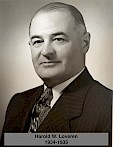
Harold Loveren was born on September 26, 1894, in Manchester, NH, to Gilbert Loveren and Minnie Smith. As a young man, he displayed an aptitude for all things mechanical, which led him to the University of New Hampshire’s College of Agriculture and the Mechanical Arts, where he obtained a bachelor’s degree in engineering. After graduating, he accepted a job at the college and eventually became the university’s superintendent of property, which required him to supervise the construction of a number of complex projects at the school, including the installation of the university pool in 1936. Despite his mechanical nature, Harold had trouble operating a friend’s motorboat in the summer of 1931 and wound up submerged in the Oyster River. After making it to the riverbank, Harold laughed along with everyone who had seen the incident, until he realized he had to jump back in to retrieve his wallet. In 1960, long after he had retired from mechanical work, Harold became vice president of the Granite State Co-operative Bank, a small financial institution in Dover, NH.
Harold B. Pinkham, 1936-1937 (41)
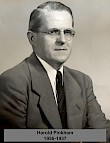 Harold B. Pinkham was born in Newmarket on April 10, 1901, to Albert Pinkham and Cora Wetherell. He graduated from Newmarket High School in June 1918, and four years later, on December 27, 1922, he married Doris Burnham from Dover, NH, and the couple eventually settled in Harold’s hometown. In his early twenties, Harold took a job at the Newmarket Post Office and went on to become the town’s postmaster, a position he held for the better part of his adult life, which occasionally led to some confusion in both Rockingham and Strafford Counties, as the longtime postmaster of Milton, NH, was also named Harold B. Pinkham. Newmarket’s Harold died on March 28, 1967, at the age of 66.
Harold B. Pinkham was born in Newmarket on April 10, 1901, to Albert Pinkham and Cora Wetherell. He graduated from Newmarket High School in June 1918, and four years later, on December 27, 1922, he married Doris Burnham from Dover, NH, and the couple eventually settled in Harold’s hometown. In his early twenties, Harold took a job at the Newmarket Post Office and went on to become the town’s postmaster, a position he held for the better part of his adult life, which occasionally led to some confusion in both Rockingham and Strafford Counties, as the longtime postmaster of Milton, NH, was also named Harold B. Pinkham. Newmarket’s Harold died on March 28, 1967, at the age of 66.
T. B. Charles, 1938-1939 (42)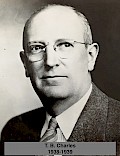
Not long after graduating Cornell University in 1915, T. B. Charles, who was born in New York State in 1890, moved to Durham, NH, and began teaching at the University of New Hampshire. In 1928, UNH made him head of the Department of Poultry Husbandry, and in 1934 he became president of the Poultry Science Association, an organization “dedicated to advancing the discovery, dissemination and application of knowledge in the poultry sciences.” Throughout his career, Professor Charles published a number of articles and studies on potential advancements and new methodologies in this field, and the US Department of Agriculture credits him and the Departments of Poultry Husbandry and Animal Sciences at UNH with forming “the foundation for the commercial hatchery industry that promoted the New Hampshire chicken breed, which was admitted to the American breed standard in 1935.” Although certain organizations, such as the National Agriculture Library, list the professor’s death in 1967, T. B. lived to be 93. He died in Odessa, NY, on December 10, 1983.
True O. Page, 1940-1941 (43)
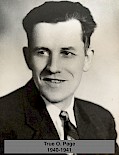 Born in Durham, NH, on July 17, 1897, True Page lived and worked in several towns along the New Hampshire-Massachusetts border as a young man. While working as a machinist at the Haverhill Shoe Manufacturing Company in Haverhill, MA, True met Rachel Skinner from Ipswich, MA, who was working at the company as a stitcher. The couple married on August 25, 1918, and moved to the Newmarket area. Shortly thereafter, True enlisted in the Army. For the duration of World War I, he was stationed at Fort Constitution in New Castle, NH. After leaving the service in 1919, True returned home and he and Rachel settled in Durham, NH, where they had three children and True went to work for the University of New Hampshire. In 1959, True and Rachel retired to Hialeah, FL, where they became active members of that town’s First United Methodist Church. True died on June 25, 1979, at the age of 81.
Born in Durham, NH, on July 17, 1897, True Page lived and worked in several towns along the New Hampshire-Massachusetts border as a young man. While working as a machinist at the Haverhill Shoe Manufacturing Company in Haverhill, MA, True met Rachel Skinner from Ipswich, MA, who was working at the company as a stitcher. The couple married on August 25, 1918, and moved to the Newmarket area. Shortly thereafter, True enlisted in the Army. For the duration of World War I, he was stationed at Fort Constitution in New Castle, NH. After leaving the service in 1919, True returned home and he and Rachel settled in Durham, NH, where they had three children and True went to work for the University of New Hampshire. In 1959, True and Rachel retired to Hialeah, FL, where they became active members of that town’s First United Methodist Church. True died on June 25, 1979, at the age of 81.
Albert Mitchell, 1942-1943 (44)
Born in Italy in 1898, Albert Mitchell immigrated to the United States in 1915 at the age of 18 and began working at the University of New Hampshire, where he held a number of positions in various departments, including forestry and horticulture, before joining the maintenance staff. He spent 50 years as the buildings supervisor and head janitor of Thompson Hall, where he was responsible for managing the clock tower. In 1967, a sophomore honor society at the university known as The Sphinx gave Albert the Sophomore Sphinx Service Award in recognition of his willingness to exceed the day-to-day requirements of his job, noting that Albert had organized a cleanup of Stoke Hall so that a group of visiting clergy had place to conduct their events and that he always opened Thompson Hall on Saturdays after football games so that players had place to recuperate and interact with the students who had come to support the team.
Phelps L. Latimer, 1944-1945 (45)
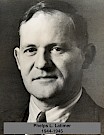 Lorenzo Phelps Latimer was born in San Francisco, CA, on July 7, 1896, to prominent California landscape artist Lorenzo Palmer Latimer and Jennie Evelyn Phelps. After graduating from the University of California, Lorenzo moved to Durham, NH, and went to work as an assistant professor of horticulture at the University of New Hampshire. Professor Latimer published several scholarly articles on various topics in the field of horticulture and conducted extensive research into the “physiological changes occurring in pear fruits during growth and ripening as determined by electrical conductivity.” On October 24, 1931, Phelps married Helen Margaret Hilton of Londonderry, VT, an analyst in the university’s gas laboratory, at a ceremony in Dover, NH. That same year, Professor Latimer published the conclusions of his study into blueberry farming, which indicated that the most successful blueberry farms “are found on hardwood land at elevations from 1,000 to 2,000 feet.”
Lorenzo Phelps Latimer was born in San Francisco, CA, on July 7, 1896, to prominent California landscape artist Lorenzo Palmer Latimer and Jennie Evelyn Phelps. After graduating from the University of California, Lorenzo moved to Durham, NH, and went to work as an assistant professor of horticulture at the University of New Hampshire. Professor Latimer published several scholarly articles on various topics in the field of horticulture and conducted extensive research into the “physiological changes occurring in pear fruits during growth and ripening as determined by electrical conductivity.” On October 24, 1931, Phelps married Helen Margaret Hilton of Londonderry, VT, an analyst in the university’s gas laboratory, at a ceremony in Dover, NH. That same year, Professor Latimer published the conclusions of his study into blueberry farming, which indicated that the most successful blueberry farms “are found on hardwood land at elevations from 1,000 to 2,000 feet.”
Norman W. Stiles, 1946-1947 (46)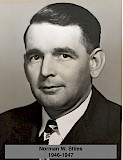
Born in Morristown, VT, on May 14, 1911, Norman Stiles grew up on a farm in Strafford, NH, where his father worked as an overseer. In 1924, at the age of 13, he contracted polio but managed to recover and went to graduate from Newmarket High School in June 1928. Four years later, Norman married Marion Kelly from Newmarket on September 26, 1932, in a small ceremony in Gotham, NH, and the couple settled in Durham, NH, where Norman eventually became Chairman of the Board of Selectmen. In 1986, in his capacity as chairman, Norman wrote to the Commissioner of the Nuclear Regulatory Commission to inform him that the town of Durham had no comments regarding the Commission’s report on the Seabrook Nuclear Power Plant, which had recently come online. In 1987, after the people of Durham voted to restructure their government, Norman, who was very much in favor of the change, noted that Durham’s old system was a “Seventeenth Century government and we are one step away from the 21st Century.”
Gordon P. Percival, 1948-1949 (47)
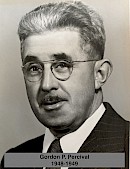 Gordon Percival was born in Kansas City, MO, on March 12, 1902. His family moved to Midfield, MA, when was young, and he graduated from Medfield High School in 1920. He eventually moved to Durham, NH, where he went to work as a chemist and assistant professor at the University of New Hampshire and became active in town politics. In 1949, the Durham Board of Selectman appointed Gordon to serve on an exploratory committee to study the feasibility and legality of altering the town’s current form of government to create the executive position of Town Manager. While working in the university’s Agricultural Experiment Station, which UNH established in 1887 to develop “innovative and impactful scientific discoveries,” Professor Percival published his findings of a study into a disease that was causing a severe cobalt deficiency in cattle and other farm animals. His recommendations, which included adding cobalt sulfate to livestock rations, virtually eliminated the deficiency in the state of New Hampshire in a matter of months.
Gordon Percival was born in Kansas City, MO, on March 12, 1902. His family moved to Midfield, MA, when was young, and he graduated from Medfield High School in 1920. He eventually moved to Durham, NH, where he went to work as a chemist and assistant professor at the University of New Hampshire and became active in town politics. In 1949, the Durham Board of Selectman appointed Gordon to serve on an exploratory committee to study the feasibility and legality of altering the town’s current form of government to create the executive position of Town Manager. While working in the university’s Agricultural Experiment Station, which UNH established in 1887 to develop “innovative and impactful scientific discoveries,” Professor Percival published his findings of a study into a disease that was causing a severe cobalt deficiency in cattle and other farm animals. His recommendations, which included adding cobalt sulfate to livestock rations, virtually eliminated the deficiency in the state of New Hampshire in a matter of months.
Charles E. Dearborn, 1950-1951 (48)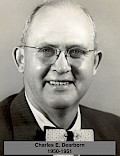
Charles Dearborn was born in Dover, NH, on November 2, 1909, and raised, for a time, in Haverhill, MA, where his father, Leroy, worked as a carpenter. When Charles was a young man, the Dearborn family moved to Greenland, NH, where they operated a small farm. In 1932, while working on the farm, Charles met Gerturde Helene Holley from Stratham, NH. The couple married on Charles’s birthday in 1932 and then moved to Newmarket where they had a son, Charles E. Dearborn, Jr., who went on to become a teacher and prominent charitable worker, logging more than seventeen thousand volunteer hours at Exeter Hospital. Charles Jr. also established the Dearborn Family Scholarship, which is awarded to a Newmarket High School student who is planning to enroll in a technical college. Charles Sr., who resided in Newmarket for the remainder of his life, died on November 7, 1988.
Henry A. Davis, 1952-1953 (49)
 Henry Davis was a longtime resident of Durham, NH, who spent many years on the board of selectmen, the sewer policy committee, and the budget committee. He was also an adjunct faculty member at UNH in the College of Agriculture and the Agriculture Experiment Station, and he was leader of the Scammell Grange in Durham, which was renamed the Henry A. Davis Memorial Building after he died in June 1981. During his tenure at UNH, Henry published a number of articles pertaining to the fields of agriculture and biological chemistry. In 1970, while serving the town of Durham as Chairman of the Board of Selectmen, Henry was the deciding vote against a motion from fellow selectmen Marion Fogg to censure their colleague Donald Sumner for using confidential town documents for political gain during a television appearance.
Henry Davis was a longtime resident of Durham, NH, who spent many years on the board of selectmen, the sewer policy committee, and the budget committee. He was also an adjunct faculty member at UNH in the College of Agriculture and the Agriculture Experiment Station, and he was leader of the Scammell Grange in Durham, which was renamed the Henry A. Davis Memorial Building after he died in June 1981. During his tenure at UNH, Henry published a number of articles pertaining to the fields of agriculture and biological chemistry. In 1970, while serving the town of Durham as Chairman of the Board of Selectmen, Henry was the deciding vote against a motion from fellow selectmen Marion Fogg to censure their colleague Donald Sumner for using confidential town documents for political gain during a television appearance.
Kenneth Dudley Carlisle, 1954-1955 (50)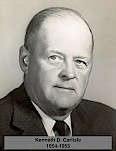
Born on August 14, 1904, in Brentwood, NH, to Clinton Carlisle and Clare Rowell, and raised in the Newmarket area, Kenneth spent many years working as a grocery clerk in Ham’s Market in Dover, NH. In 1931, while serving on the Durham, NH, Men’s Club supper committee, Kenneth helped the organization raise money to provide Christmas dinners for the poor. In July 1935, he married Ester Natalie Hale, a teacher from Rochester, NH, in a ceremony in her hometown. The couple made their home in Durham, NH, where Kenneth went to work as a mail carrier for the post office and Ester made an impact in town affairs. In 1950, Ester helped to organize the annual March of Dimes charity function to combat polio and also served as the event’s treasurer. Kenneth died on October 19, 1981, at the age of 77.